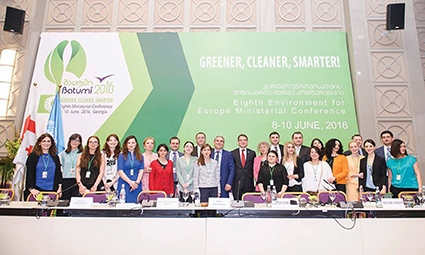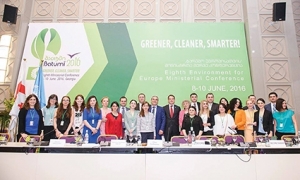Georgia Hosts UN Environmental Conference
For three days, in the framework of the 8th UN Environment for Europe Ministerial Conference, Georgia’s Black Sea coastal city Batumi hosted approximately 600 delegates from 56 countries, ministers of environmental defense and education, representatives of the business sector and business associations, and high-ranking guests from 55 international organizations. Environmental protection in the region and around the world, Green Economy and improving education in these fields were the main topics at the Ministerial on June 8-10, 2016.
The Environment for Europe Ministerial Conference is a special format of cooperation between the United Nations Economic Commission for Europe’s member countries, United Nation organizations, governmental organizations, regional environmental centers, non-governmental organizations, private sectors and other interested parties. It is a platform that facilitates discussion of global environmental issues, providing the opportunity to identify priorities and plan joint activities for sustainable development.
During the Ministerial, three main themes were chosen, amongst which Green Economy (BIG-E) was one of the top priorities. “Today, the Green Economy is regarded as one of the most important instruments for achieving sustainable development. It supports the use of national resources in a sustainable way, reduces negative impacts on the environment, creates new and green jobs and ensures the well-being of our society,” said the Prime Minister of Georgia, Giorgi Kvirikashvili, during his speech at the Ministerial.
He added that the Georgian Government supports this direction and aims to create a special environment for green business, encourage the activities of small and medium-sized enterprises in their use of renewable energy, as well as introduce green transport, green buildings and to develop eco-tourism.
Improvement of the air quality was also high on the agenda, topped by the adoption of the Batumi Action for Cleaner Air (2016–2021). Nine Georgian cities have already created an action plan for sustainable energy development to reduce CO2 emissions and create healthier environments by 2020. Moreover, by 2017, the standards established for petrol are expected to be in line with Euro 5 criteria.
“Clean air is a major factor of human health and life, and one which is directly connected with the development of the country,” said PM Kvirikashvili.
Education was named as the third important direction of the Ministerial since raising awareness about ecology among the population of the country can significantly help to solve many of the current problems.
Georgia is a green country with rich natural resources- a large number of mountains, national parks, and protected areas contribute to the environmental development of the country. Georgia aims to renew the National Strategy on Environmental Education, and the National Strategy and Action Plan on Sustainable Development.
It was recognized that the main component of environmental well-being is not only the right policy in Georgia, but also in the region and around the world. Therefore, in the framework of the Ministerial, meetings were held between the representatives of participating countries and organizations.
“Georgia should aim to become a regional leader in the environmental field,” said Gigla Agulashvili, Minister of Environment and Natural Resources Protection of Georgia.
The 8th UN Environment for Europe Ministerial Conference concluded with the adoption of a declaration –‘Cleaner, Greener, Smarter.’ The document includes the results of the conference and recommendations to improve the environmental policy for all participating countries.
Eka Karsaulidze











